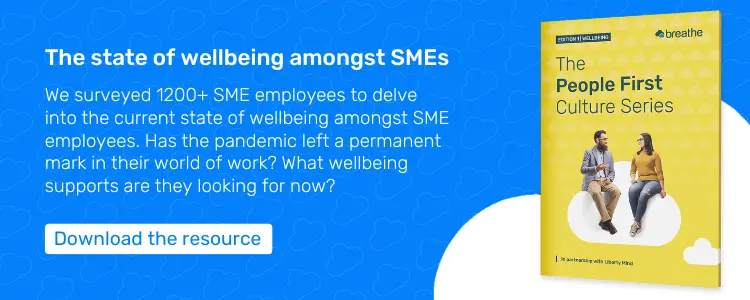Is presenteeism the new scourge of the workplace? There's significant evidence that presenteeism is widespread in the UK and it's having a huge impact on productivity. It comes at a cost, too - an estimated £29.3 billion.
And if you dig into the issues associated with presenteeism the implications aren't pretty. Let's dive in and find out what SMEs need to know about the dangers of presenteeism.
What is presenteeism?
Simply put, presenteeism is the phenomenon where instead of taking sick leave, employees attend work while feeling unwell and don’t perform at their full capacity.
The term was coined by Dr Gary Cooper in the mid-90s. Back in 2012, Legal & General estimated that presenteeism could cost the UK economy three times as much as absenteeism.
Presenteeism has many different faces. An employee might be dragging themselves into the office despite having a really nasty bug. Needless to say, they’re not going to get much work done and will probably pass the virus to their colleagues.
Other forms of presenteeism are less visible. Employees may be suffering from mental health problems and still turning up at the office. How might this affect their decision-making abilities? What about the effect on the people they work with? And will this affect their mental health in the longer term?
And the really sad news is no one wins with presenteeism - it can even cost businesses more in the long run. The overall cost of presenteeism can end up being more than if they'd taken a day's sick leave to rest and recover. 
What causes presenteeism?
The decision by an employee on whether to call in sick or turn up at work ill is rarely based on simple information around health and the ability to perform specific tasks. There are many factors which influence workers to make such decisions. The drivers of presenteeism include:
-
Cultural factors
-
Team commitment
-
Job-related pressures and workload
-
Manager attitude to sickness
-
Personality
-
Contractual obligations and job security
-
Financial circumstances
-
Certain health factors
-
A poor work-life balance
What are the effects of presenteeism?
Presenteeism has mostly negative effects, including:
-
Productivity loss
-
Poor decision making
-
Lower team morale
-
Poor physical and mental employee health
-
Mental health damage
-
Burnout
-
Workplace epidemics such as cold and sickness
How can small businesses deal with presenteeism?
There’s no magic button to prevent presenteeism. It’s a complex situation with a range of drivers. Here are some of the ways in which small businesses can start to understand presenteeism and work towards reducing it.
Recognise the link between presenteeism and company culture
Company culture can drive presenteeism in more than one way.
-
Poor management styles or a bullying culture may mean employees feel afraid to take a day off for fear of being branded as weak or uncommitted.
-
Poor communication and engagement can create demotivated employees. This can impact on mental health and contribute to presenteeism.
-
Strong teamwork and a “super positive” attitude can mean employees don’t want to let their teams down, to the extent that they come into work despite needing to take time off.
Could a shift in your culture help reduce presenteeism? You can read more about organisational culture and its effect on your employees.a9d5.jpg?width=659&name=productivity_employees_happy_office_company%20culture_shutterstock_521540056%20(1).jpg)
Understand how personality type and job role is linked to presenteeism
Different personalities have different work ethics. Some employees, especially those who are very ambitious and in more junior roles may see taking time off sick as under-performance, and that will make them more susceptible to presenteeism.
Breathe research in the wellbeing edition of the People First Culture Series revealed that in an SME survey, there were many different reasons for employees not taking time off from work, despite suffering symptoms. 25% said they were too busy, 32% couldn't financially afford time off and 20% felt pressured to work through it. Find out more by reading the full research.
In this situation, managers should encourage these employees to take time off if and when they need to.
Review how absence and attendance policies are being used
A clamp-down on absenteeism may be inadvertently causing presenteeism. Many absence policies designed to reduce absenteeism are in fact driving presenteeism because of the way they compel employees to attend work, even though they are sick.
The threat of disciplinary action or dismissal can cause stress and increase rates of presenteeism. Employees on a low wage or with financial difficulties may come into work despite being unwell because they can’t afford not to work.
If this is the case, can you review your sick pay policy to prevent presenteeism?
Encourage staff to rest and recuperate when sick
To expand on the previous point, managers and leaders have a role to play in encouraging unwell employees to stay at home until they’re healthy. This can be explained as both a duty of care to the individual and the team.
When someone comes to work despite being unwell, they invariably have reduced morale and that has a further negative impact on mental wellbeing, as well as implications for the team.
Promote wellbeing strategies
A healthier workforce is less likely to fall ill. So it figures that by building a wellbeing strategy into your business you’ll reduce presenteeism. As well as encouraging healthier habits, you can help staff recognise the signs of stress and work-related physical health issues.
There are a range of programmes you can use to educate managers and employees about wellbeing, employee engagement and productivity, such as this one from The Samaritans.
Consider increasing the opportunity to work flexibly
By permitting employees to work more flexibly, you can reduce some of the factors that contribute towards presenteeism.
Allowing employees to better balance their work and domestic life, cut the commute and work in an environment that suits them, means better overall wellbeing which in turn can reduce physical and mental ill health.
Recognise the impact that leaders have on the business
It’s also worth reflecting on the way you and other leaders in your SME behave. Sending emails late at night, messaging colleagues on a Sunday evening and leaving the office late can set an expectation for the rest of your organisation.
While it can be difficult to avoid doing this, consider how you could limit the impact on your employees.
Whether it’s scheduling emails to be sent during working hours or not coming into the office when you are suffering with a cold, you personally demonstrate the importance of working while at your best. This sets an unspoken boundary that other employees can replicate and will lead to a healthier working environment.
Download fresh insights on how to support wellbeing & ward off presenteeism within your SME in our People First Culture Series: edition 1, wellbeing.

Author: Laura Sands
Laura is a writer who enjoys getting into the detail of subjects and sharing that knowledge with snappy, interesting content. When not typing away, she enjoys walks in the woods and curling up with a good book and mug of something hot.





